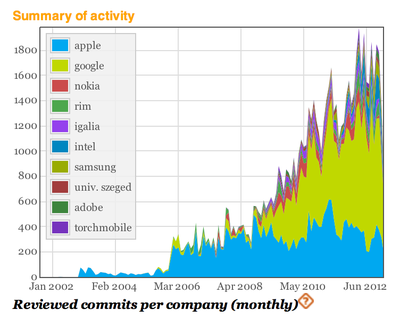Google Forking WebKit to Create New Web Rendering Engine for Chrome
Google announced today that the company is forking the WebKit rendering engine to create its own web rendering engine called 'Blink'. Google had been the using Apple-initiated WebKit project to power its Chrome web browser. Future versions, however, will now be based on this new system.
Google is now free to make changes to its rendering engine with less complexity and bureaucracy than when it was saving its changes to Webkit. The company posted this on its FAQ explaining why it wanted to create a new engine:
The main reason is that Chromium uses a different multi-process architecture than other WebKit-based browsers. So, over the years, supporting multiple architectures has led to increasing complexity for both the WebKit and Chromium communities, slowing down the collective pace of innovation.
With the change, Google has set Chrome and Apple's Safari on their own paths. Webkit was originally created by Apple as a fork to the KHTML rendering engine. Apple took interest in developing it when launching Safari for the Mac, and it now powers Safari for iOS, as well.
WebKit has been heavily adopted with over 20 companies now contributing to the project. Google and Apple, however, have remained the most active contributors to the open-source project.

In fact, Google has been the most active contributor of WebKit in the recent years. This graph from Bitergia (above) shows Google's increasing number of "commits" to WebKit over the years. Google's efforts will now be directed at 'Blink'. Apple has made no public comments about the news.
Popular Stories
Apple will launch its new iPhone 17 series in two months, and the iPhone 17 Pro models are expected to get a new design for the rear casing and the camera area. But more significant changes to the lineup are not expected until next year, when the iPhone 18 models arrive.
If you're thinking of trading in your iPhone for this year's latest, consider the following features rumored to be coming...
A new Apple TV is expected to be released later this year, and a handful of new features and changes have been rumored for the device.
Below, we recap what to expect from the next Apple TV, according to rumors.
Rumors
Faster Wi-Fi Support
The next Apple TV will be equipped with Apple's own combined Wi-Fi and Bluetooth chip, according to Bloomberg's Mark Gurman. He said the chip supports ...
Apple does not plan to refresh any Macs with updated M5 chips in 2025, according to Bloomberg's Mark Gurman. Updated MacBook Air and MacBook Pro models are now planned for the first half of 2026.
Gurman previously said that Apple would debut the M5 MacBook Pro models in late 2025, but his newest report suggests that Apple is "considering" pushing them back to 2026. Apple is now said to be...
Apple's next-generation iPhone 17 Pro and iPhone 17 Pro Max are only two months away, and there are plenty of rumors about the devices.
Below, we recap key changes rumored for the iPhone 17 Pro models.
Latest Rumors
These rumors surfaced in June and July:A redesigned Dynamic Island: It has been rumored that all iPhone 17 models will have a redesigned Dynamic Island interface — it might ...
iPhone 17 Pro and iPhone 17 Pro Max models with displays made by BOE will be sold exclusively in China, according to a new report.
Last week, it emerged that Chinese display manufacturer BOE was aggressively ramping up its OLED production capacity for future iPhone models as part of a plan to recapture a major role in Apple's supply chain.
Now, tech news aggregator Jukan Choi reports...
In select U.S. states, residents can add their driver's license or state ID to the Wallet app on the iPhone and Apple Watch, providing a convenient and contactless way to display proof of identity or age at select airports and businesses, and in select apps.
Unfortunately, this feature continues to roll out very slowly since it was announced in 2021, with only nine U.S. states, Puerto Rico,...
The iPhone 17 and iPhone 17 Air will be available in a total of nine color options, according to new information coming out of Asia.
The iPhone 17 Air's expected color options.
According to the leaker going by the account name "yeux1122" on the Korean blog Naver, accessory manufacturers are now producing camera protector rings for the iPhone 17 and iPhone 17 Air in colors to match their...
Apple will launch a new 12th generation entry-level iPad in the spring of next year, according to Bloomberg's Mark Gurman.
Apple is said to have two versions of the entry-level 11-inch iPad in development, codenamed J581 and J582. These could refer to different storage capacities – in which case, Apple may be planning to drop the existing lowest capacity option. The current iPad 11 is...





















